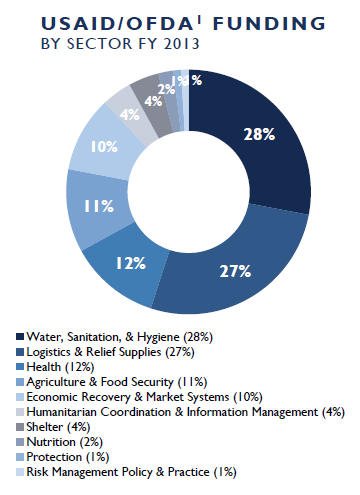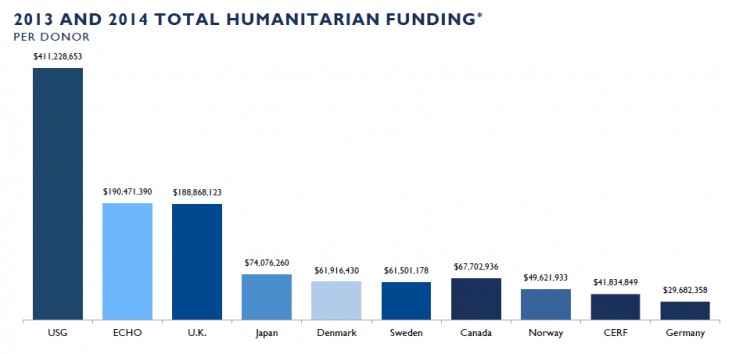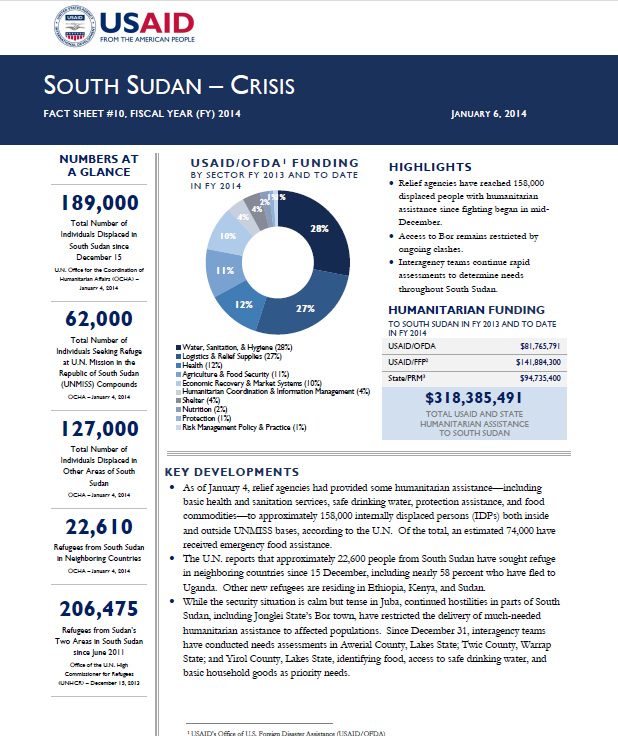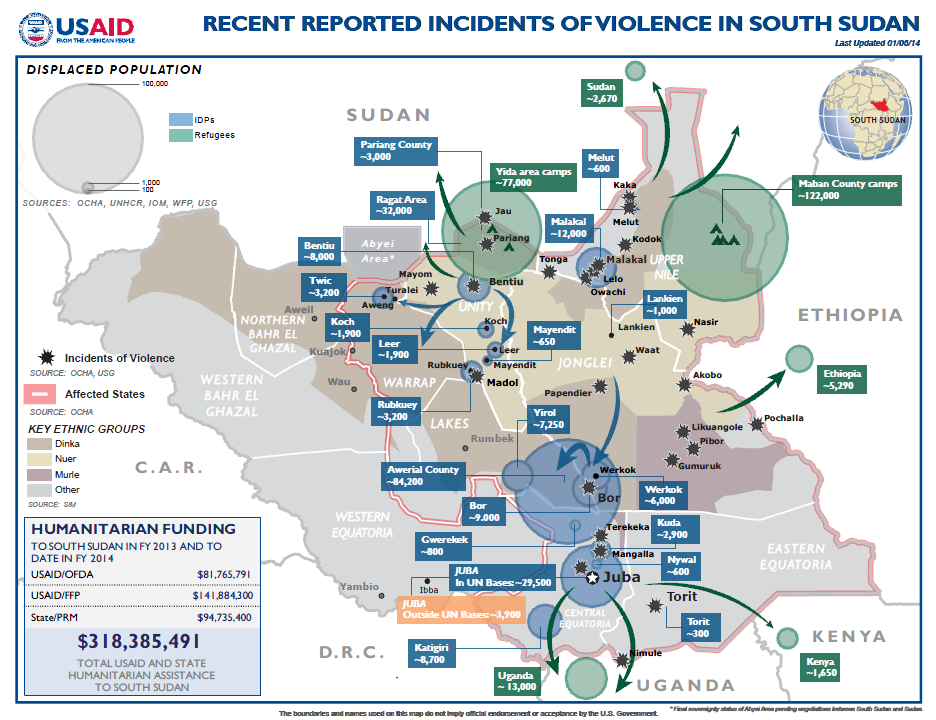- What We Do
- Agriculture and Food Security
- Democracy, Human Rights and Governance
- Economic Growth and Trade
- Education
- Environment and Global Climate Change
- Gender Equality and Women's Empowerment
- Global Health
- Humanitarian Assistance
- Transformation at USAID
- Water and Sanitation
- Working in Crises and Conflict
- U.S. Global Development Lab
Speeches Shim
January 6, 2013
Numbers At A Glance
189,000
62,000
127,000
22,610
206,475
Humanitarian Funding:
To South Sudan To Date In FY2013 and FY2014:

| USAID/OFDA | $81,765,791 |
| USAID/FFP | $141,884,300 |
| State/PRMDoD | $94,735,400 |
| TOTAL | $318,385,491 |
Highlights
Relief agencies have reached 158,000 displaced people with humanitarian assistance since fighting began in mid-December.
Access to Bor remains restricted by ongoing clashes.
Interagency teams continue rapid assessments to determine needs throughout South Sudan.
KEY DEVELOPMENTS
As of January 4, relief agencies had provided some humanitarian assistance—including basic health and sanitation services, safe drinking water, protection assistance, and food commodities—to approximately 158,000 internally displaced persons (IDPs) both inside and outside UNMISS bases, according to the U.N. Of the total, an estimated 74,000 have received emergency food assistance.
The U.N. reports that approximately 22,600 people from South Sudan have sought refuge in neighboring countries since 15 December, including nearly 58 percent who have fled to Uganda. Other new refugees are residing in Ethiopia, Kenya, and Sudan.
While the security situation is calm but tense in Juba, continued hostilities in parts of South Sudan, including Jonglei State’s Bor town, have restricted the delivery of much-needed humanitarian assistance to affected populations. Since December 31, interagency teams have conducted needs assessments in Awerial County, Lakes State; Twic County, Warrap State; and Yirol County, Lakes State, identifying food, access to safe drinking water, and basic household goods as priority needs.
SITUATION AND DISPLACEMENT UPDATE
Between January 2 and 4, hostilities continued in South Sudan, with the most active fighting in Bor, Jonglei State; Mangalla, Central Equatoria State; and Mayom County, Unity State, according to OCHA.
Access to food, safe drinking water, and sanitation services is severely limited for populations in Bor, including for the estimated 9,000 people sheltering in the UNMISS base. Due to ongoing fighting, humanitarian access remains restricted and flights carrying relief supplies are frequently unable to land in the town, the U.N. reports.
The U.N. recently revised the number of estimated IDPs in South Sudan to approximately 189,000 people to reflect an increase of IDPs in Lakes State’s Awerial County—hosting as many as 84,000 individuals—and a reduction of IDPs initially reported in Ragat Area, Unity State.
Of the 22,600 South Sudanese refugees residing in neighboring countries, approximately 13,000 have entered Uganda since December 15. The U.N. reports that an additional 5,290 refugees have fled to Ethiopia, joining approximately 400 Ethiopians who previously sought refuge in South Sudan. Kenya’s Kakuma refugee camp has registered 1,650 South Sudanese refugees, while others have traveled to the Dadaab camp complex and Nairobi. Relief agencies estimate that approximately 2,670 South Sudanese have fled to Sudan.
HUMANITARIAN RESPONSE IN JUBA, CENTRAL EQUATORIA STATE
Relief organizations continue scaling up multi-sector response activities for those affected in Juba, particularly for people sheltering in the two UNMISS bases—Tong Ping and U.N. House 3. Although protection issues and health and water, sanitation, and hygiene (WASH) concerns remain, humanitarian assistance is improving conditions in the camps.
South Sudan Crisis Fact Sheet #10 January 6, 2014 ![]() (pdf - 364k)
(pdf - 364k)
The International Organization for Migration (IOM) completed IDP registration at the Tong Ping UNMISS compound on January 2, registering a total of approximately 6,500 households, or 17,400 people. IDP registration at U.N. House 3 began on January 1 and remains ongoing, with a total of 2,158 households, or 4,839 people registered to date.
U.N. agencies and non-governmental organizations (NGOs) are supplying IDPs in Tong Ping with 12 liters of safe drinking water per person per day, meeting international Sphere[1] standards, according to OCHA. The U.N. notes that organizations are currently planning for a second distribution of buckets and soap in Tong Ping. In both Juba UNMISS compounds, relief organizations continue to conduct protection patrols, hygiene promotion trainings, and latrine construction.
The U.N. reports that seven suspected measles cases were recorded in Tong Ping. Campaigns coordinated by the U.N. Children’s Fund (UNICEF), the U.N. World Health Organization (WHO), and the Government of the Republic of South Sudan Ministry of Health have reached more than 19,800 children between the ages of six months and 15 years in Tong Ping and U.N. House 3 with measles vaccinations, as well as nearly 21,000 who received polio immunizations. As a result, measles vaccination coverage rates in the compounds have reached 88 percent in Tong Ping and 90 percent in U.N. House 3.
Health-focused organizations continue to provide reproductive health services in the Juba compounds, with 55 deliveries recorded in Tong Ping to date.
On January 2, NGOs began screening for children in Tong Ping experiencing malnutrition. Children identified as malnourished with no medical complications will receive outpatient treatment. Screening and treatment activities are scheduled to expand to U.N. House 3 in the coming days.
UNICEF has documented 65 unaccompanied children at the UNMISS base at Tong Ping, reuniting five children with their families, and begun reunification activities at U.N. House 3. UNICEF and partner organizations have developed a coordination mechanism to facilitate family tracing in the camps, while the International Committee of the Red Cross (ICRC) will support family tracing for those residing outside of the camps. USAID/OFDA recently announced $4 million to support UNICEF nutrition, protection, and WASH interventions in South Sudan.
South Sudan Crisis Map #10 January 6, 2014 ![]() (pdf - 420k)
(pdf - 420k)
HUMANITARIAN NEEDS AND RESPONSE IN OTHER AREAS OF SOUTH SUDAN
On January 3, humanitarian staff gained access to the U.N. World Food Program (WFP) warehouse in Bor to assess remaining stock and transport relief supplies to the UNMISS compound. The majority of commodities in the Bor warehouse remain intact, although the warehouse sustained some physical damage.
UNICEF is supporting a medical clinic at the UNMISS Bentiu base in Unity State, currently hosting an estimated 8,000 IDPs. Between December 23 and 30, the clinic registered more than 1,300 patients, the majority experiencing upper respiratory infections. With $1 million, USAID/OFDA is also supporting WHO to operate mobile clinics to improve access to health services focusing on women and children.
Nine suspected cases of measles and one related death have been reported in the Bentiu compound, according to UNICEF. UNICEF and other organizations are scheduled to begin measles and polio vaccination campaigns for children under 15 years of age in Awerial and Bentiu in the coming days.
The number of individuals seeking shelter at the UNMISS base in Malakal, Upper Nile State, fluctuates based on insecurity in the area, according to the U.N. As of January 4, an estimated 12,000 IDPs were at the base as tensions remained high despite relative calm.
On January 3, relief organizations delivered 87,000 liters of water to the UNMISS compound in Malakal, where access to water and sanitation services remain the priority issues. NGOs have also constructed 117 latrines and hand-washing stations at the base. A mobile clinic is slated to become operational in the coming days, while a measles vaccination is also planned.
The U.N. reports that an emergency water treatment system is under construction in Awerial to provide 60,000 liters of water daily. Organizations are currently chlorinating water at collection points and have distributed water containers to approximately 30,000 individuals.
Relief agencies have also begun malnutrition screening in Awerial, aiming to reach as many as 1,600 children under five years of age. Those experiencing acute malnutrition will receive therapeutic food supplements.
OTHER HUMANITARIAN ASSISTANCE
On January 4, a flight funded by the U.K. Department for International Development (DFID) landed in Juba, carrying water containers and purification supplies from Oxfam to support affected communities in South Sudan. This in-kind contribution is in addition to the £12.5 million—$20.5 million—in emergency assistance announced on December 31.
In addition, an Australian Air Force aircraft arrived in South Sudan on January 6 to provide emergency equipment and supplies, including tents, sanitation items, and water purification materials, to the U.N. Mission. Additional supply flights are planned in the coming days.
2013 TOTAL HUMANITARIAN FUNDING*

*Funding figures are as of January 6, 2014. All international figures are according to OCHA’s Financial Tracking Service and based on international commitments during the 2013 calendar year, while USG figures are according to the USG and reflect the most recent USG commitments based on the 2013 fiscal year, which began on October 1, 2012, and ended September 30, 2013, as well as the 2014 fiscal year, which began on October 1, 2013.



Comment
Make a general inquiry or suggest an improvement.